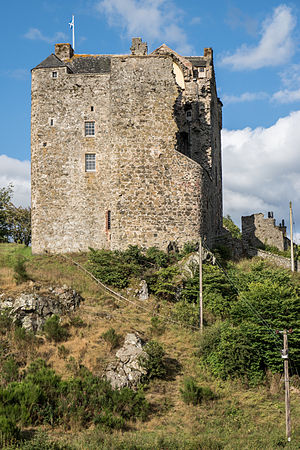Neidpath Castle
| Neidpath Castle | |
|---|---|
| Near Peebles, Scotland, United Kingdom | |

Neidpath Castle
|
|
| Coordinates |
55°39′5.5″N 3°12′53.2″W / 55.651528°N 3.214778°WCoordinates: 55°39′5.5″N 3°12′53.2″W / 55.651528°N 3.214778°W grid reference NT238404 |
| Type | L-plan tower house |
| Site information | |
| Owner | Earl of Wemyss and March |
| Open to the public |
No |
| Condition | Ruined |
| Site history | |
| Built | c.1263-1266 |
| Built by | Sir Simon Fraser |
| Materials | Rubble and sandstone |
Neidpath Castle is an L-plan rubble-built tower house, overlooking the River Tweed about 1 mile (1.6 km) west of Peebles in the Borders of Scotland. The castle is closed to the public.
An early castle was probably built here by Sir Simon Fraser (d.1306) of Oliver Castle between 1263 and 1266, while he held the office of High Sheriff of Tweeddale. The barony of Neidpath was acquired by the Hay family, through marriage to the Fraser heiress in the early 14th century. Sir William de Haya (d.c.1390) probably built the present castle in the late 14th century. It was held by them until the 17th century, although Sir William's grandson, Sir William Hay, married the daughter and heiress of Sir Hugh Gifford of Yester, acquiring Yester Castle, which became the principal family seat, although Neidpath continued to be used. It was visited by Mary, Queen of Scots in 1563, and by her son James VI in 1587.
In 1645, Neidpath was garrisoned against the Royalist forces of James Graham, 1st Marquess of Montrose, although the following year, John Hay of Yester joined the King's party, and was created 1st Earl of Tweeddale by King Charles II. During Oliver Cromwell's invasion of Scotland in 1650, Neidpath was attacked. Mike Salter states that the castle was surrendered without a fight, although other sources suggest that it required the longest assault on any stronghold south of the River Forth to force it to surrender. James Taylor, writing in 1887, states that the 13th-century tower was demolished by artillery during the siege. During the 1660s, the 2nd Earl of Tweeddale remodelled the castle, and constructed outbuidings. The 2nd Earl was an agricultural "improver", who planted an avenue of yews, of which one side remains. However, he was declared bankrupt, and sold Neidpath to William Douglas, 1st Duke of Queensberry in 1686.
...
Wikipedia

